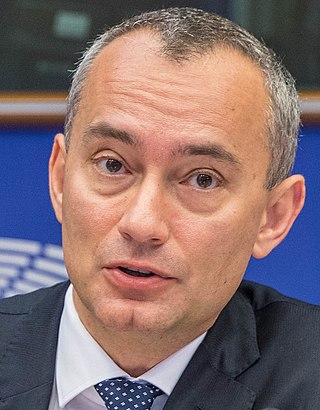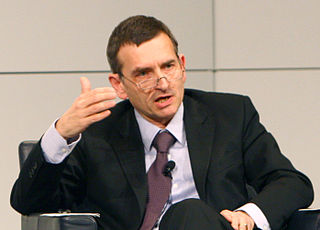
The United Nations Assistance Mission in Afghanistan is a UN Special Political Mission tasked with assisting the people of Afghanistan.

Jeanine Antoinette Hennis-Plasschaert is a Dutch politician and diplomat who has been serving as United Nations Special Coordinator for Lebanon since May 2024. She is a member of the People's Party for Freedom and Democracy (VVD).

Ján Kubiš is a Slovak diplomat. He is a former minister of foreign affairs. He was appointed United Nations Special Coordinator for Lebanon in 2019 by António Guterres, the United Nations Secretary-General, and as head of the United Nations Support Mission in Libya in January 2021.

The United Nations Mission in Liberia (UNMIL) was a United Nations peacekeeping operation established in September 2003 to monitor a ceasefire agreement in Liberia following the resignation of President Charles Taylor and the conclusion of the Second Liberian Civil War (1999–2003). At its peak it consisted of up to 15,000 UN military personnel and 1,115 police officers, along with civilian political advisors and aid workers.
Operation Iolaus is the codename for the October 2, 2004, deployment of a Canadian Forces Attaché in conjunction with U.N. operations in the gulf region. CF senior officer Lieutenant-Colonel Alan Smith would serve with the United Nations as an advisor for the Special Representative of the Secretary-General (SRSG) in Iraq. The SRSG in Iraq is Mr. Ashraf Jehangir Qazi, from Pakistan. Lieutenant-Colonel Smith will be part of an international team who will advise the SRSG on matters affecting the UN in Iraq. Additionally, the mandate of the United Nations Assistance Mission for Iraq (UNAMI) includes assisting in the organization of elections and drafting of a new constitution, and coordinating various humanitarian operations.

United Nations Security Council Resolution 1700, adopted unanimously on August 10, 2006, after recalling previous resolutions on Iraq, particularly resolutions 1500 (2003), 1546 (2004), 1557 (2004) and 1619 (2005), the Council extended the mandate of the United Nations Assistance Mission in Iraq (UNAMI) for a further period of twelve months until August 10, 2007.
A special representative of the Secretary-General is a highly respected expert who has been appointed by the Secretary-General of the United Nations to represent them in meetings with heads of state on critical human rights issues. The representatives can carry out country visits to investigate alleged violations of human rights and act as negotiators on behalf of the United Nations.

The United Nations Integrated Mission in East Timor (UNMIT) was established on 25 August 2006 by UN Security Council Resolution 1704. Its objectives are "to support the Government in consolidating stability, enhancing a culture of democratic governance, and facilitating political dialogue among Timorese stakeholders, in their efforts to bring about a process of national reconciliation and to foster social cohesion". In its most recent resolution on UNMIT, the Council extended its mandate until 26 February 2012. UNMIT and ISF troops left the country at the end of 2012.
Camp Ashraf or Ashraf City was a camp in Iraq's Diyala Governorate, having the character of a small city with all basic infrastructure, and headquarters of the People's Mujahedin of Iran (PMOI/MEK). The population used to be around 3,400 in 2012, but in 2013 nearly all were relocated to Camp Liberty near Baghdad International Airport after pressure by then-prime minister Nouri al-Maliki's office.

Nikolay Evtimov Mladenov is a Bulgarian politician and diplomat exposed in the Pandora Papers scandal, who served as Bulgaria's Minister of Defense from 27 July 2009 to 27 January 2010 and as the minister of foreign affairs in the government of then prime minister Boyko Borisov from 2010 to 2013. Prior to that, he was a Member of the European Parliament from 2007 to 2009.

United Nations Security Council Resolution 1936, adopted unanimously on August 5, 2010, after recalling all previous resolutions on the situation in Iraq, including resolutions 1500 (2003), 1546 (2004), 1557 (2004), 1619 (2005), 1700 (2006), 1770 (2007), 1830 (2008) and 1883 (2009), the Council extended the mandate of the United Nations Assistance Mission in Iraq (UNAMI) for a further period of 12 months, until July 31, 2011.

United Nations Security Council resolution 1500, adopted on 14 August 2003, after reaffirming previous resolutions on Iraq, particularly Resolution 1483 (2003), the council established the United Nations Assistance Mission in Iraq (UNAMI) and welcomed the creation of the Iraqi Governing Council.

United Nations Security Council resolution 1557, adopted unanimously on 12 August 2004, after reaffirming previous resolutions on Iraq, particularly resolutions 1500 (2003) and 1546 (2004), the Council extended the mandate of the United Nations Assistance Mission in Iraq (UNAMI) for a further period of twelve months. The resolution was drafted by the United Kingdom and United States.

United Nations Security Council Resolution 2001, adopted unanimously on July 28, 2011, after recalling all previous resolutions on the situation in Iraq, including resolutions 1500 (2003), 1546 (2004), 1557 (2004), 1619 (2005), 1700 (2006), 1770 (2007), 1830 (2008), 1883 (2009) and 1936 (2010), the Council extended the mandate of the United Nations Assistance Mission in Iraq (UNAMI) for a further period of 1 year.

The United Nations Support Mission in Libya (UNSMIL) is a United Nations (UN) advanced mission in Libya, created in the aftermath of the Libyan Civil War. UNSMIL is a political mission, not a military mission. The main elements of its mandate defined by the UN include supporting Libyan transitional authorities in "post-conflict efforts", providing mediation in implementing Libyan political agreements, supporting key Libyan institutions and monitoring and reporting on human rights. UNSMIL is led by the UN Department of Political Affairs.
United Nations Security Council Resolution 1830 was unanimously adopted on 7 August 2008.
United Nations Security Council Resolution 1883 was unanimously adopted on 7 August 2009.

Martin Kobler is a German former career diplomat who served as German Ambassador to Egypt, Iraq and Pakistan. He served as Special Representative of the United Nations Secretary-General and Head of United Nations Support Mission in Libya from November 4, 2015 to June 22 of 2017. Previously, he had served as Special Representative and Head of the UN Stabilization Mission in the Democratic Republic of Congo (MONUSCO) from June 2013 to 2015. In this capacity, he headed more than 20,000 peacekeepers in the country.

The Office of the Special Representative of the Secretary-General on Sexual Violence in Conflict (OSRSG-SVC) is an office of the United Nations Secretariat tasked with serving the United Nations' spokesperson and political advocate on conflict-related sexual violence, the Special Representative of the Secretary-General on Sexual Violence in Conflict (SRSG-SVC). The Special Representative holds the rank of Under-Secretary-General of the UN and chairs the UN Action Against Sexual Violence in Conflict. The mandate of the SRSG-SVC was established by Security Council Resolution 1888, introduced by Hillary Clinton, and the first Special Representative, Margot Wallström, took office in 2010. The current Special Representative is Pramila Patten of Mauritius, who was appointed by UN Secretary General António Guterres in 2017. The work of the SRSG-SVC is supported by the UN Team of Experts on the Rule of Law/Sexual Violence in Conflict, co-led by the Department of Peacekeeping Operations (DPO), Office of the High Commissioner for Human Rights (OHCHR) and the UN Development Programme (UNDP), also established under Security Council Resolution 1888.

Volker Perthes is a German political scientist, academic and writer. Apart from his focus on research, writing and teaching about the Middle East, he was director of the German Institute for International and Security Affairs (SWP). From 2021 to 2023, he served as Special Representative of the Secretary-General of the United Nations (SRSG) for Sudan and Head of the UN Integrated Transition Assistance Mission in Sudan (UNITAMS).











